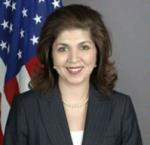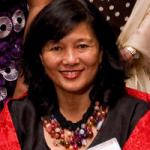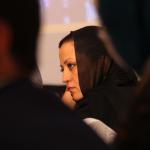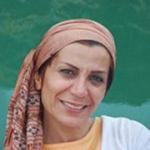The U.S. State Department’s Special Representative to Muslim Communities on role models, the importance of technology in changing the narrative around Muslim women, and why it’s everyone’s responsibility to tell—and hear—diverse stories. This is an IMOW transcription of an interview conducted in November 2012.
IMOW: You’re a strong role model for many young Muslim women today, which is important when so few strong female role models exist. Who was your role model when you were starting out?
Farah: That is a really critical question. Role models can really make a difference for young women of any religious background and heritage. For me specifically I use the role model that has been a presence in my life all my life, and that’s my mom. She is a single mom. My parents got divorced when I was young. She is now retired but she was the one person who, throughout my life, was the embodiment of a learned, smart, strong, caring nurturer who is also a very accomplished professional. All my life she was the person that I looked to as an example of what I could do. There was never any question of being able to achieve, there was never any question of being able to follow your passion, your dreams, there was never any question about how important education was. For me, all my life, from the time I was very young until today, she remains the person who I look to as an example of how I can marry many of my interests to be able to be as balanced as I can, to execute what I think is so important, which is the understanding of identity.
I came to this country when I was a baby. My mother made a gigantic sacrifice for her family to grow up in a place that was very different from the large family that we had back in India. I looked to her as I was growing up to be able to balance the issues of identity and understand the importance of being proud of being both American and being Muslim, and to understand that there was no contradiction between the two. And further, because my mother chose to be in a position for a public hospital – she worked for the government – this idea of giving back to the community and public service was instilled in me from a very young age. So my mom is definitely my role model—she was then and she is now.
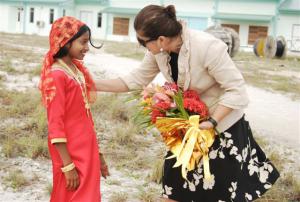
For the women who may not have had a strong female role model like you did, are there any other Muslim women role models or leaders that you have encountered?
I think it is important to talk about what a role model is. I have been to almost 80 countries around the world in the last three years and, and for different cultures, the idea of a role model is different, and so it is important to say a couple of things. Young Muslims girls don’t necessarily have to have a role model that is female—the examples of what you can be or what you can achieve can be either male or female. The issue is really finding people that can connect with you around your passions. It’s the ability for that young person to see themself in that person and to be inspired by that person’s own journey.
There are hundreds of women I have met all over the world who inspire in many different ways. The question then becomes how you build the platform so that these women can be exposed to many.

How do you build that platform?
There are many ways. Much of the work that I am doing as the Special Representative to Muslim Communities is to talk about what I am seeing. So the first part is to recalibrate the narrative. We don’t hear a narrative in the public space that talks about Muslim women in a strong way – it is the exception and not the rule, and I think the first piece of this is really talking in a different way about what it means to be female and Muslim.
The stereotypes and sound bites are very pervasive in a negative way: you never hear about the normalcy of Muslim women in everyday life around the world. You only hear about the exception; a kind of victim mentality is the norm. You have to push back when you hear that–one way is to talk about it, one way is to show the different examples and talk about who those women are of many different age groups, cultures, forms. There is not a monolith that is Islam; there is not a monolith that is the definition of a Muslim woman. Someone can be as Muslim in Stockholm as they are in Sao Paolo as they are in Surabaya. The region does not matter. To talk about that diversity is very important, and to talk about what is really happening on the ground as opposed to how the caricatures are built around the conversation of female and Muslim.
While travelling, what do you see happening on the ground? What are some of the issues that these incredibly diverse women are facing?
I am glad you phrased it this way. Yes, there is diversity, and so I would hate to say all Muslim women are saying this or that. But there are a couple of common trends that I have seen. The first is that which spans men and women. The issue of identity: what does it mean to be modern and Muslim? What is the difference between culture and identity? These are questions that young people are asking all over the world.
The second trend is a question that I have heard all over the world, whether I am talking to a person in Bosnia, or I am talking to a young person in Senegal, or a young person in Malaysia. A lot of young women are asking me questions about the role of women in Islam. And there isn’t, frankly, enough out there that is textured, so that these young people can have the conversation that explores and asks questions. Not everybody is a scholar of Islam, not everybody has the right answers, and so they are not going to places that are diverse in the way they are thinking about things.
One of the great NGOs in the world that is dealing with this issue is called Sisters in Islam, based in Kuala Lumpur. They have addressed that issue directly so that they are giving young women the opportunity to hear from different perspectives about what is being said.
Finally, it is really important to understand that these women are trying to unpack the difference between what a religion says and what a culture says. What is a cultural norm? What is something that has been part of their heritage? What is simply a cultural tradition or a heritage tradition that has nothing to do with their religions? So these young people are asking these questions very loudly. And I would hope that there are more and more answers for these young women so that they have an opportunity to explore their own answers in a way that makes sense for them.
I think it is very problematic that the loudest voices out there are the voices that say to these women that there is only one way to be a Muslim or there is only one way to be a female, and this is what they must do. There is so much diversity on the planet in terms of how women are living their religion out loud in so many different ways. It is our responsibility to be fair and dignified in the way in which we talk about what we see and what’s actually going on. Not every woman dresses the same way, not every woman eats the same things, and not everyone speaks about their religion in the same way. Some places in the world women go to mosque all the time, other people don’t. Others choose to do things in new ways. There are places like Morocco that have a whole group of women who are spiritual leaders and have been trained by the state to help. They aren’t Imams, but they are basically social workers who have a very strong religious understanding. Do people in other parts of the world know that that exists?
The final thing is truly to look at the issue of women in general. They’re the ones who are raising the children. Their roles in communities are unbelievably important. We have to allow their voices to be part of the conversation. That is where we have a very weak spot in the way the world talks about Muslim women, and the way that Muslim women themselves give themselves the opportunity to do so.
That is what we are hoping with this exhibition: to give Muslim women the opportunity to speak for themselves. I want to take a step back for a moment; you are talking about a lot of wonderful things that are happening around the world whether it’s in Morocco or with Sisters in Islam. When you meet everyone as Special Representative to Muslim Communities, what do you do in your role?
Secretary Clinton has assigned my position in a really special way, and that is really looking at demographics. I have a global mandate, so it is as important to me to engage Muslims and Muslim majority countries as it is to engage Muslims who live as minorities. So the first piece is that my job is global. The second thing is that, when you look at the 1.6 billion Muslims in the world, which make up one fourth of humanity, 62% of those people are under the age of 30, so my mandate is to engage with youth and people under the age of 30. The third piece is that I do people-to-people engagement so its grassroots, it’s communities, and I go on the ground – no matter what country I am in, whether I am in Argentina, whether it is Italy, whether it is Tajikistan, whether it is Singapore. I am talking to people on the ground, to communities made up of formal organizations—an NGO, a university, or individuals who are doing really great things—and the way we get those names or set up the opportunities for me to listen are through the work of the embassies on the ground who have reached out to a lot of different kinds of people to bring them together. But I also often use social media as a platform to say, for example, “I’m going to Brazil, I’m going to be in Sao Paolo – who should I meet with? Who are the organizations that are doing X, Y, or Z?” We get input from both regular people around the world as well as the work of our embassies. Once we schedule and set up these meetings I am able to listen and talk with these people. If we hear of an initiative that has not been highlighted, we use our platform to highlight it; we connect an NGO in one part of the world with some other part of the world that is doing the exact same thing where they can learn from. So we act as a convener, as a facilitator, and an intellectual partner with the ideas that we hear on the ground.
What can young women, especially artists, thinkers, writers, etc., do to change the dialogue or the negative attitudes that they are often victims of?
The most attention goes to the loudest voices, and so we see the characterizations of what it means to be Muslim female embedded in news stories or in pop culture every single day. We need people to tell the real stories and talk about alternative narratives. I am so happy you asked the question about culture, because people who tell stories through traditional means—writing books, writing blogs, sending tweets, using their pen and paper if you will—to be able to do that as well as the cultural aspect of art or music is so important. I met a great group of young people in Bahrain who are artists who are using visuals to tell their stories and to speak about their identities. I have met hip-hop artists; I have met people who are nontraditional actors, who because of the things that they are doing, and they are telling us a new story about what it means.
That’s what I want to see—I want to see young women who happen to be Muslim talk to us in the ways or mediums that are most comfortable for them, to push back against stereotypes, to tell their stories in their real voices, to create alternative narratives in every way possible. Because when you flood the marketplace with alternatives, the conversation will begin to change.
I have to be a devil’s advocate for a moment and ask: How can you, working with the government, actually help to repair the image and relationship with Muslims when many feel that the government itself is the one that damaged that image?
Farah: I would push back against that because the responsibility of stereotypes does not come from one government or somebody else’s government anywhere else in the world. Pop culture in 2013 is so vast, and so out of the box, that no one can say “It is because of this television station, or this government, that said something and so the whole world listened.” Goodness, wouldn’t we wish that we had a magic bullet that we could push a channel on TV and people would believe. There has been stereotyping around issues for decades, and I will say the complexity in the last 11 years has definitely been unique, no question about it. But I will absolutely push back against the idea of the stereotyping of what it means to be Muslim. When you go back to what American presidents have said about Islam, starting with our Founding Fathers, you see the way our constitution has given the opportunities for Muslims to be equal citizens in our country. You can go back to George Washington, and Jefferson, and move it forward to the more recent times of Eisenhower and Ford and Nixon and Clinton and Bush and Obama, and you will see the parallels across the board. There has not been a flicker of change in the respect and decency that they have given all faiths in our country. The context of the global situation in the last 11 years has allowed the narrative of an “us” and a “them” to come forward. There is no war of the West versus Islam. America is not at war with Islam and never has been.
The key here is to understand who the influences are on television, in the movies, on blogs, in the way things are depicted. Everybody should take responsibility, including general citizens who don’t condemn and push back when prejudice and bigotry are pushed forward.
Are you asking that all Muslims who are reading this come together and start pushing back against the dominate narrative, especially against the loud voices that are out there? What one piece of advice do you have for the young women around the world who would like to do it?
That is why, in fact, we catalyzed an initiative called Hours Against Hate, which asks young people to volunteer one hour or more of their time for someone who doesn’t look like them, pray like them, or live like them. This initiative started here at the Department of State, but it has gone all over the world. In fact, in was so successful that the London 2012 Olympic and Paralympics games used this initiative as a partner for their games. Because we all, all of us, all mankind, must strengthen the idea of mutual respect. I would urge your viewers to this exhibit to go online to Facebook, login to Hours Against Hate and to learn more about this initiative.
